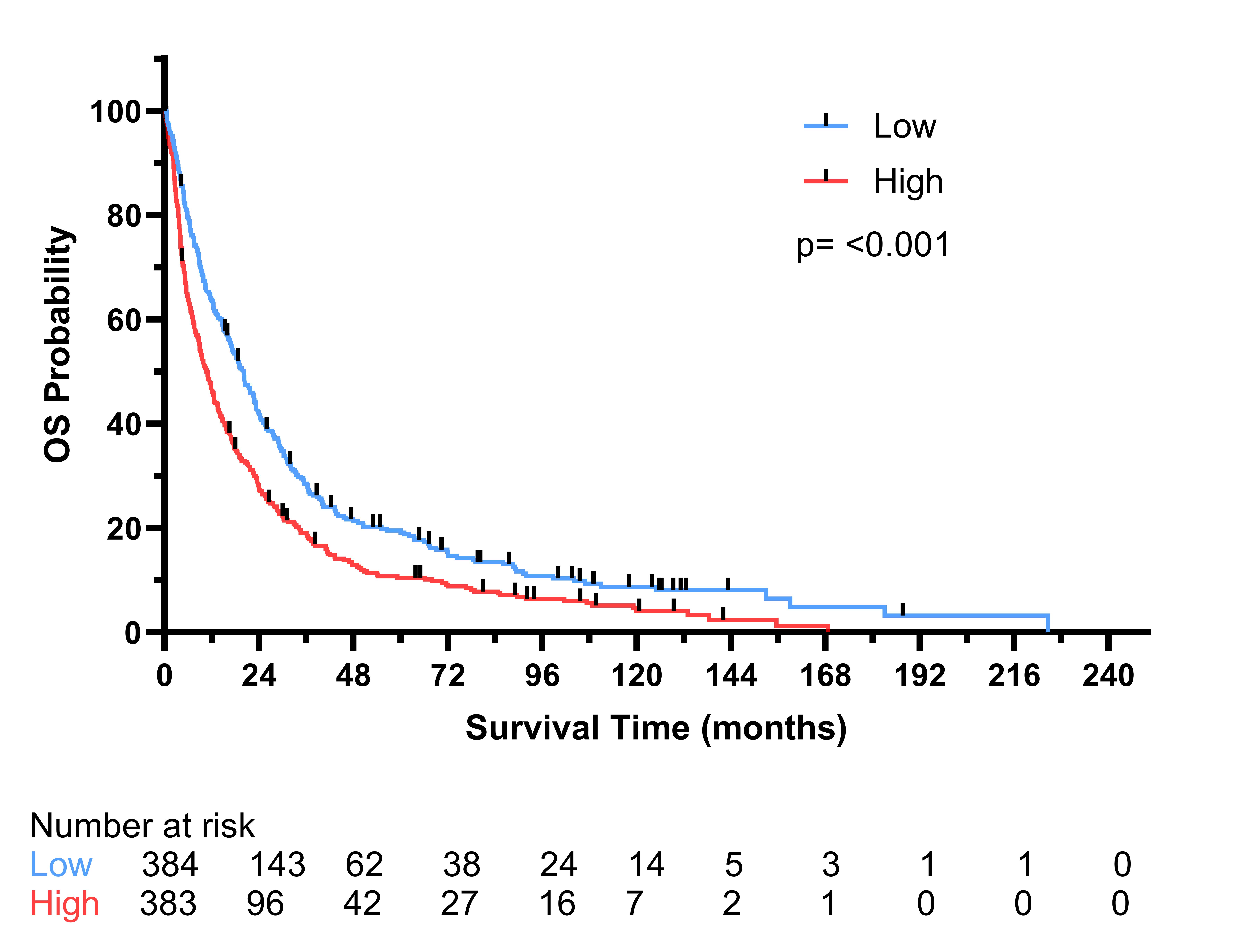Monday Poster Session
Category: Liver
P3784 - Circulating Fibroblast Growth Factor 21 (FGF21) as a Prognostic Biomarker in Hepatocellular Carcinoma
Monday, October 27, 2025
10:30 AM - 4:00 PM PDT
Location: Exhibit Hall

Joe R. Eid, MD
MD Anderson Cancer Center
Houston, TX
Presenting Author(s)
Award: ACG Presidential Poster Award
Joe R. Eid, MD, Merih Yalciner, MD, Lianchun Xiao, MS, Ryan Sun, PhD, Mahesh Kumar Kannan, PhD, Manal Hassan, MD, PhD, Asif Rashid, MD, Emad Singer, MD, Hesham M. Amin, MD, Ahmed O. Kaseb, MD
MD Anderson Cancer Center, Houston, TX
Introduction: Fibroblast growth factor 21 (FGF21) is a hormone synthesized and released by liver cells. Deficiency in FGF21 has been shown to be associated with steatosis, inflammation, fibrosis, and increased risk of hepatocellular carcinoma (HCC) development. Moreover, recent evidence suggests that elevated FGF21 levels may paradoxically correlate with worse outcomes in HCC. We aimed to evaluate the association between serum FGF21 levels, clinicopathological parameters, and overall survival (OS) in HCC patients.
Methods: From 2001 to 2014, newly diagnosed HCC patients were recruited as part of an IRB-approved study. At the time of diagnosis, blood samples were collected and sent to a CLIA-certified lab. A multiplexed immunoassay panel (DiscoveryMAP v.3.3; Myriad RBM) was used to quantitate FGF21 on an automated, Luminex xMAP-based platform. Using FGF21 median as a cutoff point, all patients were categorized into subjects with low and high levels. Independent t-test was used to compare FGF21 levels between the different subgroups. Kaplan-Meier method was used to estimate OS. Cox proportional hazards model was used to evaluate the association of OS with covariates.
Results: A total of 767 HCC patients were analyzed. Mean age was 65 years, and 74% were male. Median FGF21 value was 0.41 ng/mL. Importantly, our data has shown that patients with advanced HCC including those with multinodular tumors, vascular invasion, metastasis, a higher Child-Pugh score, CLIP, BCLC, TNM, and ECOG stage had significantly increased FGF21 plasma levels (p< 0.05 for all clinicopathological parameters). The Kaplan-Meier curve (Figure 1) demonstrates that OS was significantly shorter in patients with high FGF21 compared to those with low FGF21 (24 months OS 28% vs 43%; p< 0.001). On multivariate analysis (Table 1), high FGF21 was significantly associated with worse OS (HR: 1.422; 95% CI: 1.180-1.714; p< 0.001).
Discussion: Elevated circulating FGF21 levels correlate with advanced clinicopathologic features and poor OS in HCC patients. Because elevated FGF21 during liver stress may indicate significant metabolic disruption, our data provides strong evidence that FGF21 may represent a valuable prognostic and potentially therapeutic biomarker in HCC. Future wide-scale studies are required to further establish this idea.

Figure: Figure 1. Kaplan-Meier curve representing OS among FGF21-Low and FGF21-High groups

Figure: Table 1. Multivariate analysis: Predictors of OS in patients with HCC (n=767)
Disclosures:
Joe Eid indicated no relevant financial relationships.
Merih Yalciner indicated no relevant financial relationships.
Lianchun Xiao indicated no relevant financial relationships.
Ryan Sun indicated no relevant financial relationships.
Mahesh Kumar Kannan indicated no relevant financial relationships.
Manal Hassan indicated no relevant financial relationships.
Asif Rashid indicated no relevant financial relationships.
Emad Singer indicated no relevant financial relationships.
Hesham Amin indicated no relevant financial relationships.
Ahmed Kaseb indicated no relevant financial relationships.
Joe R. Eid, MD, Merih Yalciner, MD, Lianchun Xiao, MS, Ryan Sun, PhD, Mahesh Kumar Kannan, PhD, Manal Hassan, MD, PhD, Asif Rashid, MD, Emad Singer, MD, Hesham M. Amin, MD, Ahmed O. Kaseb, MD. P3784 - Circulating Fibroblast Growth Factor 21 (FGF21) as a Prognostic Biomarker in Hepatocellular Carcinoma, ACG 2025 Annual Scientific Meeting Abstracts. Phoenix, AZ: American College of Gastroenterology.
Joe R. Eid, MD, Merih Yalciner, MD, Lianchun Xiao, MS, Ryan Sun, PhD, Mahesh Kumar Kannan, PhD, Manal Hassan, MD, PhD, Asif Rashid, MD, Emad Singer, MD, Hesham M. Amin, MD, Ahmed O. Kaseb, MD
MD Anderson Cancer Center, Houston, TX
Introduction: Fibroblast growth factor 21 (FGF21) is a hormone synthesized and released by liver cells. Deficiency in FGF21 has been shown to be associated with steatosis, inflammation, fibrosis, and increased risk of hepatocellular carcinoma (HCC) development. Moreover, recent evidence suggests that elevated FGF21 levels may paradoxically correlate with worse outcomes in HCC. We aimed to evaluate the association between serum FGF21 levels, clinicopathological parameters, and overall survival (OS) in HCC patients.
Methods: From 2001 to 2014, newly diagnosed HCC patients were recruited as part of an IRB-approved study. At the time of diagnosis, blood samples were collected and sent to a CLIA-certified lab. A multiplexed immunoassay panel (DiscoveryMAP v.3.3; Myriad RBM) was used to quantitate FGF21 on an automated, Luminex xMAP-based platform. Using FGF21 median as a cutoff point, all patients were categorized into subjects with low and high levels. Independent t-test was used to compare FGF21 levels between the different subgroups. Kaplan-Meier method was used to estimate OS. Cox proportional hazards model was used to evaluate the association of OS with covariates.
Results: A total of 767 HCC patients were analyzed. Mean age was 65 years, and 74% were male. Median FGF21 value was 0.41 ng/mL. Importantly, our data has shown that patients with advanced HCC including those with multinodular tumors, vascular invasion, metastasis, a higher Child-Pugh score, CLIP, BCLC, TNM, and ECOG stage had significantly increased FGF21 plasma levels (p< 0.05 for all clinicopathological parameters). The Kaplan-Meier curve (Figure 1) demonstrates that OS was significantly shorter in patients with high FGF21 compared to those with low FGF21 (24 months OS 28% vs 43%; p< 0.001). On multivariate analysis (Table 1), high FGF21 was significantly associated with worse OS (HR: 1.422; 95% CI: 1.180-1.714; p< 0.001).
Discussion: Elevated circulating FGF21 levels correlate with advanced clinicopathologic features and poor OS in HCC patients. Because elevated FGF21 during liver stress may indicate significant metabolic disruption, our data provides strong evidence that FGF21 may represent a valuable prognostic and potentially therapeutic biomarker in HCC. Future wide-scale studies are required to further establish this idea.

Figure: Figure 1. Kaplan-Meier curve representing OS among FGF21-Low and FGF21-High groups

Figure: Table 1. Multivariate analysis: Predictors of OS in patients with HCC (n=767)
Disclosures:
Joe Eid indicated no relevant financial relationships.
Merih Yalciner indicated no relevant financial relationships.
Lianchun Xiao indicated no relevant financial relationships.
Ryan Sun indicated no relevant financial relationships.
Mahesh Kumar Kannan indicated no relevant financial relationships.
Manal Hassan indicated no relevant financial relationships.
Asif Rashid indicated no relevant financial relationships.
Emad Singer indicated no relevant financial relationships.
Hesham Amin indicated no relevant financial relationships.
Ahmed Kaseb indicated no relevant financial relationships.
Joe R. Eid, MD, Merih Yalciner, MD, Lianchun Xiao, MS, Ryan Sun, PhD, Mahesh Kumar Kannan, PhD, Manal Hassan, MD, PhD, Asif Rashid, MD, Emad Singer, MD, Hesham M. Amin, MD, Ahmed O. Kaseb, MD. P3784 - Circulating Fibroblast Growth Factor 21 (FGF21) as a Prognostic Biomarker in Hepatocellular Carcinoma, ACG 2025 Annual Scientific Meeting Abstracts. Phoenix, AZ: American College of Gastroenterology.

